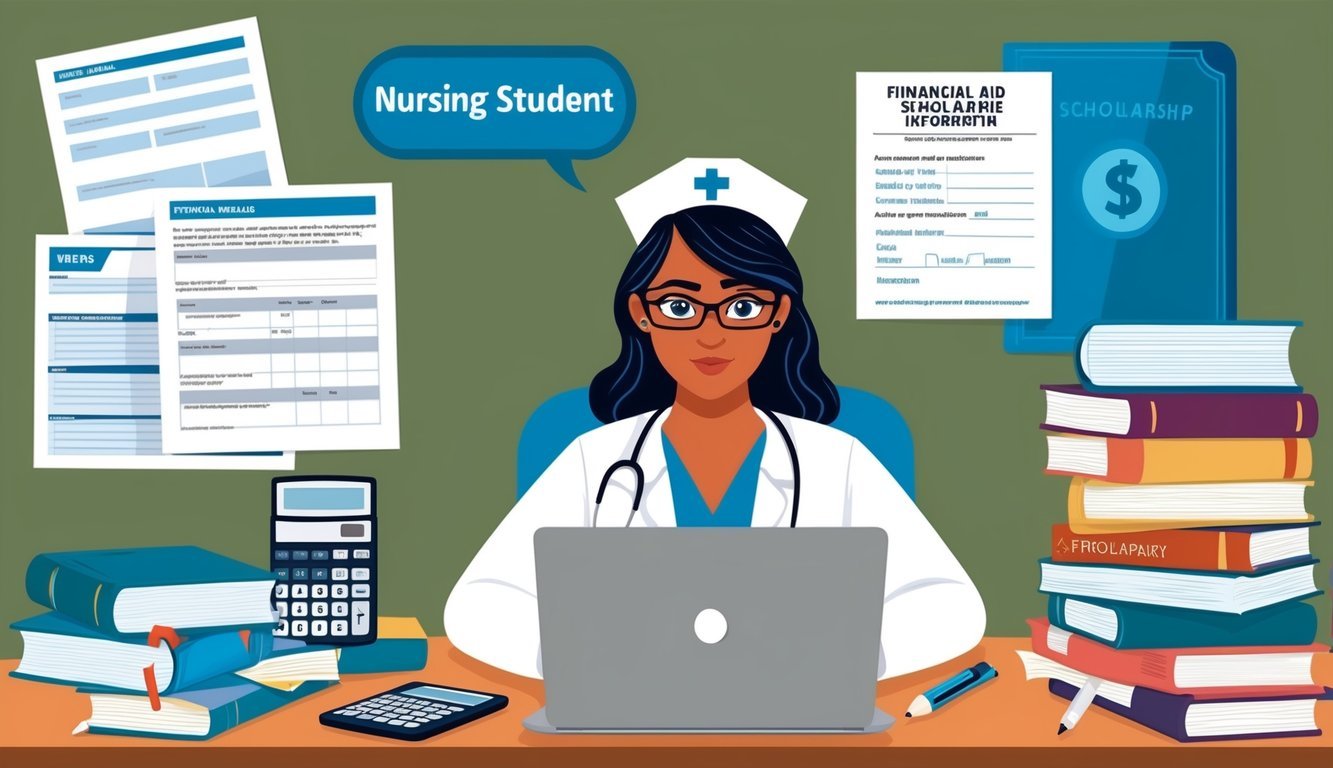A four-year nursing degree, known as a Bachelor of Science in Nursing (BSN), equips you with the essential knowledge and skills to launch a successful career in healthcare. This comprehensive program prepares you not only for nursing duties but also for advanced roles in the field.
Whether you aim to work in hospitals, clinics, or community health settings, a BSN opens doors to various opportunities.
Admission to a BSN program typically requires a high school diploma or equivalent, along with prerequisite courses in subjects like biology and chemistry.
Throughout the program, you will engage in a mix of classroom learning, hands-on clinical practice, and specialized courses that align with your interests.
This balanced approach ensures you are ready for the NCLEX-RN exam and the challenges of the nursing profession.
Financing your education can be manageable through scholarships, grants, and loans specifically available for nursing students.
With this degree, you will not only enhance your earning potential but also gain critical skills that contribute to your professional advancement in an ever-evolving healthcare landscape.
Key Takeaways
- A BSN provides essential nursing knowledge and skills.
- Financial aid options can help manage education costs.
- A four-year degree supports career growth and advancement.
Overview of a Bachelor’s Degree in Nursing (BSN)

A Bachelor of Science in Nursing (BSN) is a crucial step for those pursuing a career as a registered nurse.
This degree provides vital skills and knowledge needed to deliver high-quality patient care.
Understanding the importance of a BSN and how it compares to an Associate Degree in Nursing (ADN) can help you make informed decisions for your nursing education.
The Importance of a BSN for Registered Nurses
Earning a BSN is becoming increasingly important in the nursing field.
Over 70% of U.S. nurses hold a BSN or higher.
Many employers prefer or even require a BSN for registered nursing positions.
This degree helps you develop critical thinking skills, leadership abilities, and comprehensive clinical knowledge.
A BSN program typically covers a range of topics, including:
- Health assessment
- Pharmacology
- Research methods
- Community health
These subjects prepare you for the challenges of modern healthcare.
Additionally, nurses with a BSN often have better job prospects and higher salaries compared to those with an ADN.
On average, BSN-prepared nurses can earn around $89,000 per year, while those with an ADN earn about $73,000 annually.
Comparison: ADN versus BSN
When deciding between an ADN and a BSN, consider the following key differences:
| Factor | ADN | BSN |
|---|---|---|
| Duration | 2 years | 4 years |
| Coursework | Basic nursing skills | Advanced nursing concepts |
| Career Opportunities | Limited | Broader options |
| Leadership Roles | Fewer available | More opportunities |
ADNs provide a quicker route to becoming a registered nurse, but BSNs offer deeper education and skills.
This additional training enables nurses to pursue roles in management, research, and education, enhancing your career potential in the nursing field.
For more insights on BSN programs, check out Nurse.org.
Admission Requirements for BSN Programs
To enter a Bachelor of Science in Nursing (BSN) program, you need to meet certain admission requirements.
These requirements include specific coursework and maintaining a good academic standing.
Prerequisite Coursework for Nursing Degrees
Before applying to a BSN program, you must complete certain prerequisite courses.
Commonly required courses may include:
- Biology: Introduction to biology or human anatomy.
- Chemistry: General chemistry or organic chemistry.
- Psychology: Introductory psychology and human development.
- Mathematics: College algebra or statistics.
These courses ensure you have a solid foundation in the sciences relevant to nursing.
Some programs may also require courses in English and liberal arts to develop communication skills.
Always check the specific requirements of each program, as they can vary.
Understanding Cumulative GPA and Other Criteria
Your cumulative GPA is a critical factor in the admission process.
Most BSN programs require a minimum GPA of around 2.5 to 3.0 on a 4.0 scale.
Stronger GPAs increase your chances of admission.
In addition to GPA, some programs might ask for standardized test scores, letters of recommendation, and a personal statement.
These elements help the admissions committee evaluate your readiness for nursing school.
Be sure to prepare thoroughly, as meeting these admission requirements will help you secure your place in a BSN program.
For more details, you can explore the common admission requirements for BSN programs.
Core Nursing Curriculum and Specializations
In a four-year nursing degree, you will engage in a core curriculum that covers essential subjects and provides opportunities to specialize in specific areas of nursing.
This section highlights the fundamental courses you will encounter and the specialized fields available to you.
Fundamental Courses: Anatomy, Physiology, and Pharmacology
You will study Anatomy, Physiology, and Pharmacology as foundational courses.
These subjects are crucial for understanding the human body and how it functions.
- Anatomy teaches you the structure of the body and its systems, which is essential for assessing patient health.
- Physiology focuses on how these systems work, providing insights into normal and abnormal bodily functions.
- Pharmacology covers how medications affect the body, including their uses, side effects, and interactions.
Together, this knowledge forms the backbone of your nursing care, enabling you to provide safe and effective treatment to patients.
Specialized Nursing Areas: Critical Care and Community Health
As you progress, you may choose to specialize in areas like Critical Care or Community Health.
-
Critical Care nursing involves providing care for patients with severe, life-threatening conditions. This area demands quick decision-making and advanced skills to monitor and manage patients in intensive care units. You will learn to use specialized equipment and administer complex medications.
-
Community Health nursing focuses on promoting health and preventing disease within communities. You will work with diverse populations and understand social determinants of health. This specialization emphasizes education, outreach, and collaboration with other health professionals to improve overall community well-being.
Through these core and specialized courses, you will be well-prepared for a successful nursing career.
For more information about nursing curricula, you can visit NurseJournal.org.
Clinical Practice and Experience

In a four-year nursing degree, gaining clinical practice and real-world experience is essential.
This includes hands-on patient care and practical training in various settings, which prepare you for your nursing career.
Acquiring Hands-On Clinical Experience
Hands-on clinical experience is vital for developing your nursing skills.
This experience occurs during your clinical practicum, which is part of your coursework.
You will work with real patients under the supervision of licensed nurses and instructors.
During these sessions, you will engage in activities like monitoring vital signs, administering medications, and providing basic patient care.
Each nursing program typically requires a set number of clinical hours to ensure you receive adequate exposure to different patient populations and healthcare settings.
Completing these hours helps build your confidence and competency as a nurse.
Clinical Simulation Labs and Clinical Hours Requirement
Clinical simulation labs are another critical component of your training.
These labs use realistic scenarios to mimic patient care situations.
You practice nursing skills such as patient assessment, communication, and decision-making.
These simulations are crucial because they allow you to make mistakes in a safe environment.
You can learn how to respond to various medical situations without the risk of harming real patients.
Most programs include these labs to help you meet the clinical hours requirement, which typically includes both simulation and actual patient care hours.
Together, hands-on experience and simulation labs will significantly enhance your readiness for a nursing career.
Financing Your Nursing Education

Paying for your nursing degree is a significant commitment.
Understanding financial aid options, tuition costs, and other expenses will help you prepare for this journey.
Exploring Financial Aid, Grants, and Scholarships
You can find various ways to finance your nursing education through financial aid, grants, and scholarships.
Many schools offer financial aid packages based on your financial need.
The Free Application for Federal Student Aid (FAFSA) is the first step to qualify for federal aid.
Consider these types of financial aid:
- Federal Grants: Need-based awards that do not require repayment, like the Pell Grant.
- Scholarships: Offered by schools, private organizations, and professional nursing associations. For example, some scholarships can provide up to $5,000 per year.
- Loans: Federal and private loans can help cover costs, but remember they must be repaid with interest.
Research specific nursing programs’ financial aid options to find suitable opportunities.
Planning for Tuition Costs and Other Expenses
Tuition costs for a four-year Bachelor of Science in Nursing (BSN) program vary widely.
On average, tuition can range from $26,000 to over $104,000 depending on the school.
Additional expenses include:
- Fees: Student service and registration fees may apply.
- Books and Supplies: This often costs around $1,000 per year.
- Room and Board: Costs depend on your living situation, whether on-campus or off-campus.
When budgeting, consider creating a detailed table or list to track all expected costs.
Preparing a monthly budget will help you manage expenses effectively as you pursue your nursing education.
Look into nursing school tuition for detailed insights.
Career Advancement and Professional Development
In the nursing field, career advancement is essential for growth and effective patient care.
Focusing on higher education and leadership skills provides pathways for professional development.
Transitioning From RN to BSN
Transitioning from an RN to a BSN opens many doors.
With a Bachelor of Science in Nursing, you enhance your knowledge and skills, which can lead to better job opportunities.
Key Benefits of obtaining a BSN include:
- Increased job prospects: Many employers prefer or require a BSN for certain positions.
- Higher earning potential: BSN nurses often earn more than those with an ADN.
- Advanced roles: A BSN qualifies you for leadership positions and specialized nursing roles.
Online programs for RN-to-BSN bridge programs make this transition easier, allowing you to earn your degree efficiently.
You can explore options through resources like Nurse Journal.
Leadership Skills and Management Opportunities
Enhancing your leadership skills is vital for career growth.
As you advance, you may take on roles that require management abilities.
Essential Leadership Skills include:
- Communication: Effective communication builds trust and teamwork.
- Decision-making: Strong leaders make informed choices that affect patient care and team dynamics.
- Critical thinking: Analyzing situations and solving problems is critical in healthcare.
Management opportunities often arise in roles like Nurse Manager or Clinical Coordinator.
These positions involve overseeing staff, budgeting, and improving patient care.
Developing these skills through mentorship and continuing education can significantly impact your nursing career.
By focusing on these areas, you can position yourself for success in the nursing profession.
Frequently Asked Questions

This section addresses common inquiries regarding a 4-year BSN program.
You will find specific information related to admission requirements, salary comparisons, and career opportunities.
What are the typical admission requirements for a 4-year BSN program?
Admission requirements for a 4-year Bachelor of Science in Nursing (BSN) program often include:
| Requirement | Description |
|---|---|
| High School Diploma | A completed high school education. |
| GPA Requirement | A minimum cumulative GPA (often 2.5 or higher). |
| Entrance Exam | ACT or SAT scores may be required. |
| Pre-requisite Courses | Completion of biology, chemistry, and math courses. |
| Letters of Recommendation | Usually required from teachers or professionals in healthcare. |
| Personal Statement | An essay about your motivation to pursue nursing. |
These criteria can vary by school, so check specific program details.
How does the salary of a BSN graduate compare to an RN with an associate degree?
BSN graduates generally earn higher salaries compared to those with an Associate Degree in Nursing (ADN).
According to data:
| Degree | Average Salary |
|---|---|
| BSN | $70,000 – $85,000 |
| ADN | $55,000 – $70,000 |
Having a BSN can lead to better job opportunities and higher pay at some institutions.
What are the differences between various types of nursing degrees?
Nursing degrees can vary significantly.
Here’s a brief comparison:
| Degree Type | Duration | Overview |
|---|---|---|
| BSN | 4 years | Bachelor’s degree, offers a comprehensive education. |
| ADN | 2 years | Associate degree, focuses on practical skills. |
| Diploma | 2-3 years | Education through hospital programs, now less common. |
| MSN | 2 years post-BSN | Master’s degree, prepares for advanced practice roles. |
Each degree serves different career paths in nursing.
What career opportunities can one expect after obtaining a BSN?
With a BSN, you can pursue various nursing roles, such as:
- Registered Nurse (RN): Provides patient care in hospitals and clinics.
- Clinical Nurse Specialist: Works in specialized areas, offering advanced care.
- Nurse Educator: Teaches future nurses in academic settings.
- Nurse Manager: Oversees nursing staff and operations in healthcare settings.
Having a BSN can also open doors to leadership positions.
Is an RN required to have a 4-year degree to advance in the nursing field?
While many leadership roles and advanced practice positions prefer or require a BSN, it is not strictly necessary for all RN positions.
However, earning a BSN can enhance your chances for advancement and specialization.
What is the highest level of education available in nursing?
The highest level of education in nursing is a Doctor of Nursing Practice (DNP) or a Ph.D. in Nursing.
These programs focus on research, theories, and advanced clinical practices.
For more details, you can explore programs at institutions like Western Governors University.

